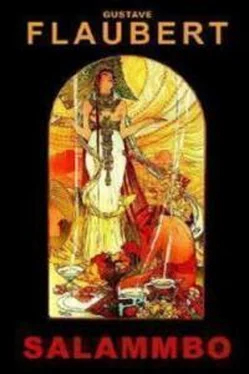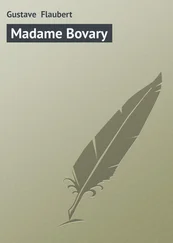Sometimes a man raised on the shoulders of another would drive a pin between the stones, and then making use of it as a step to reach further, would place a second and a third; and, protected by the edge of the battlements, which stood out from the wall, they would gradually raise themselves in this way; but on reaching a certain height they always fell back again. The great trench was full to overflowing; the wounded were massed pell–mell with the dead and dying beneath the footsteps of the living. Calcined trunks formed black spots amid opened entrails, scattered brains, and pools of blood; and arms and legs projecting half way out of a heap, would stand straight up like props in a burning vineyard.
The ladders proving insufficient the tollenos were brought into requisition,—instruments consisting of a long beam set transversely upon another, and bearing at its extremity a quadrangular basket which would hold thirty foot–soldiers with their weapons.
Matho wished to ascend in the first that was ready. Spendius stopped him.
Some men bent over a capstan; the great beam rose, became horizontal, reared itself almost vertically, and being overweighted at the end, bent like a huge reed. The soldiers, who were crowded together, were hidden up to their chins; only their helmet–plumes could be seen. At last when it was twenty cubits high in the air it turned several times to the right and to the left, and then was depressed; and like a giant arm holding a cohort of pigmies in its hand, it laid the basketful of men upon the edge of the wall. They leaped into the crowd and never returned.
All the other tollenos were speedily made ready. But a hundred times as many would have been needed for the capture of the town. They were utilised in a murderous fashion: Ethiopian archers were placed in the baskets; then, the cables having been fastened, they remained suspended and shot poisoned arrows. The fifty tollenos commanding the battlements thus surrounded Carthage like monstrous vultures; and the Negroes laughed to see the guards on the rampart dying in grievous convulsions.
Hamilcar sent hoplites to these posts, and every morning made them drink the juice of certain herbs which protected them against the poison.
One evening when it was dark he embarked the best of his soldiers on lighters and planks, and turning to the right of the harbour, disembarked on the Taenia. Then he advanced to the first lines of the Barbarians, and taking them in flank, made a great slaughter. Men hanging to ropes would descend at night from the top of the wall with torches in their hands, burn the works of the Mercenaries, and then mount up again.
Matho was exasperated; every obstacle strengthened his wrath, which led him into terrible extravagances. He mentally summoned Salammbo to an interview; then he waited. She did not come; this seemed to him like a fresh piece of treachery,—and henceforth he execrated her. If he had seen her corpse he would perhaps have gone away. He doubled the outposts, he planted forks at the foot of the rampart, he drove caltrops into the ground, and he commanded the Libyans to bring him a whole forest that he might set it on fire and burn Carthage like a den of foxes.
Spendius went on obstinately with the siege. He sought to invent terrible machines such as had never before been constructed.
The other Barbarians, encamped at a distance on the isthmus, were amazed at these delays; they murmured, and they were let loose.
Then they rushed with their cutlasses and javelins, and beat against the gates with them. But the nakedness of their bodies facilitating the infliction of wounds, the Carthaginians massacred them freely; and the Mercenaries rejoiced at it, no doubt through jealousy about the plunder. Hence there resulted quarrels and combats between them. Then, the country having been ravaged, provisions were soon scarce. They grew disheartened. Numerous hordes went away, but the crowd was so great that the loss was not apparent.
The best of them tried to dig mines, but the earth, being badly supported, fell in. They began again in other places, but Hamilcar always guessed the direction that they were taking by holding his ear against a bronze shield. He bored counter–mines beneath the path along which the wooden towers were to move, and when they were pushed forward they sank into the holes.
At last all recognised that the town was impregnable, unless a long terrace was raised to the same height as the walls, so as to enable them to fight on the same level. The top of it should be paved so that the machines might be rolled along. Then Carthage would find it quite impossible to resist.
The town was beginning to suffer from thirst. The water which was worth two kesitahs the bath at the opening of the siege was now sold for a shekel of silver; the stores of meat and corn were also becoming exhausted; there was a dread of famine, and some even began to speak of useless mouths, which terrified every one.
From the square of Khamon to the temple of Melkarth the streets were cumbered with corpses; and, as it was the end of the summer, the combatants were annoyed by great black flies. Old men carried off the wounded, and the devout continued the fictitious funerals for their relatives and friends who had died far away during the war. Waxen statues with clothes and hair were displayed across the gates. They melted in the heat of the tapers burning beside them; the paint flowed down upon their shoulders, and tears streamed over the faces of the living, as they chanted mournful songs beside them. The crowd meanwhile ran to and fro; armed bands passed; captains shouted orders, while the shock of the rams beating against the rampart was constantly heard.
The temperature became so heavy that the bodies swelled and would no longer fit into the coffins. They were burned in the centre of the courts. But the fires, being too much confined, kindled the neighbouring walls, and long flames suddenly burst from the houses like blood spurting from an artery. Thus Moloch was in possession of Carthage; he clasped the ramparts, he rolled through the streets, he devoured the very corpses.
Men wearing cloaks made of collected rags in token of despair, stationed themselves at the corners of the cross–ways. They declaimed against the Ancients and against Hamilcar, predicted complete ruin to the people, and invited them to universal destruction and license. The most dangerous were the henbane–drinkers; in their crisis they believed themselves wild beasts, and leaped upon the passers–by to rend them. Mobs formed around them, and the defence of Carthage was forgotten. The Suffet devised the payment of others to support his policy.
In order to retain the genius of the gods within the town their images had been covered with chains. Black veils were placed upon the Pataec gods, and hair–cloths around the altars; and attempts were made to excite the pride and jealousy of the Baals by singing in their ears: "Thou art about to suffer thyself to be vanquished! Are the others perchance more strong? Show thyself! aid us! that the peoples may not say: 'Where are now their gods?'"
The colleges of the pontiffs were agitated by unceasing anxiety. Those of Rabbetna were especially afraid—the restoration of the zaimph having been of no avail. They kept themselves shut up in the third enclosure which was as impregnable as a fortress. Only one among them, the high priest Schahabarim, ventured to go out.
He used to visit Salammbo. But he would either remain perfectly silent, gazing at her with fixed eyeballs, or else would be lavish of words, and the reproaches that he uttered were harder than ever.
With inconceivable inconsistency he could not forgive the young girl for carrying out his commands; Schahabarim had guessed all, and this haunting thought revived the jealousies of his impotence. He accused her of being the cause of the war. Matho, according to him, was besieging Carthage to recover the zaimph; and he poured out imprecations and sarcasms upon this Barbarian who pretended to the possession of holy things. Yet it was not this that the priest wished to say.
Читать дальше









![Гюстав Флобер - Закат Карфагена [Сборник]](/books/414440/gyustav-flober-zakat-karfagena-sbornik-thumb.webp)
